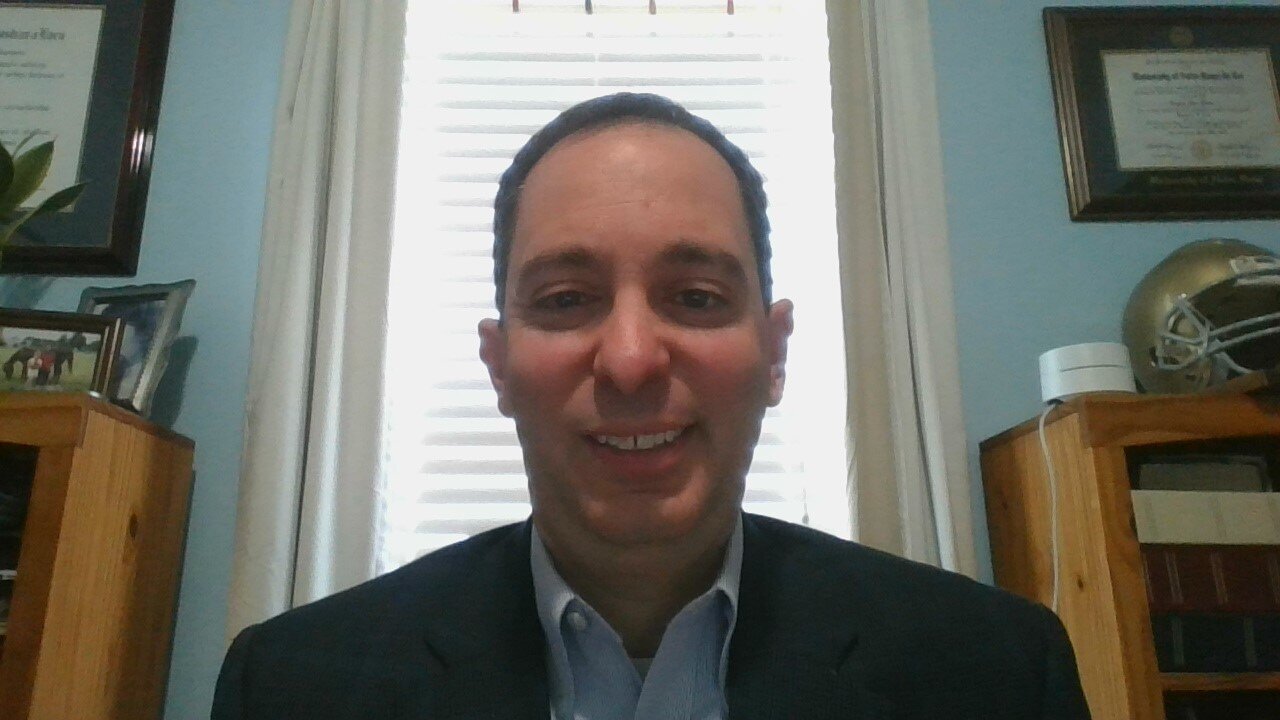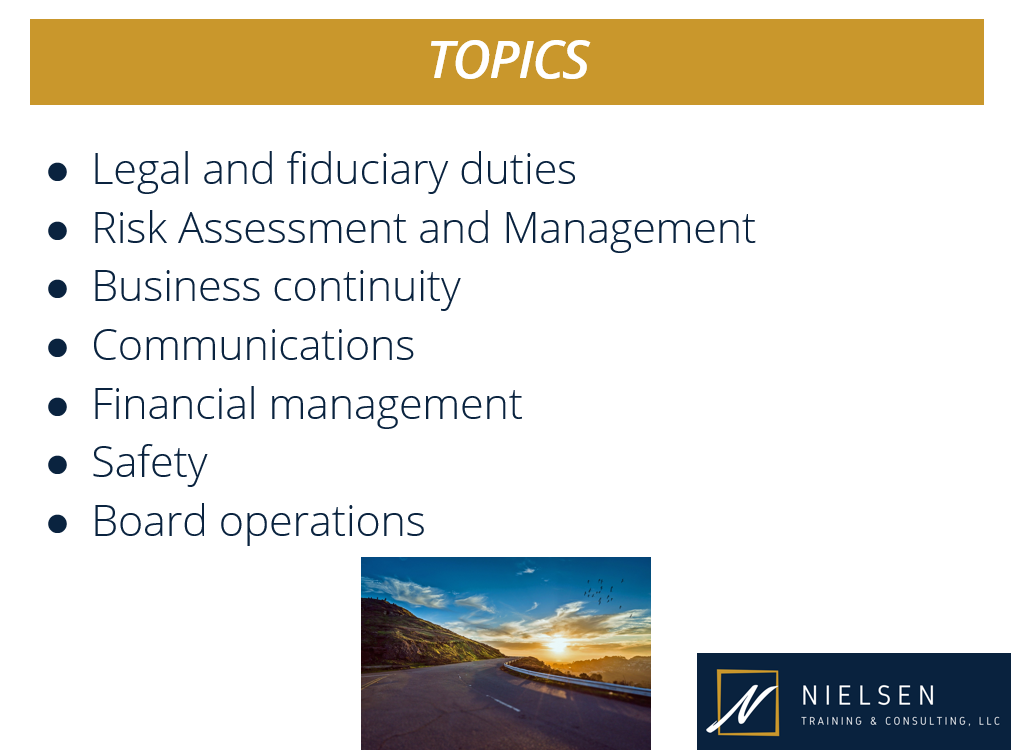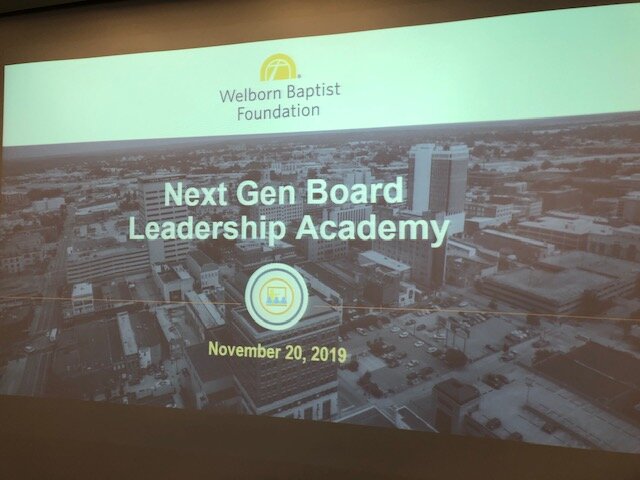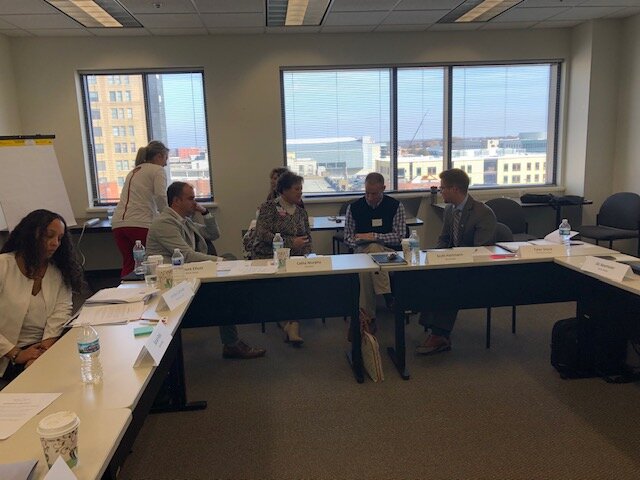
Latest News
FREE Webinar: Managing the Virtual Board Meeting
Do you want to improve the effectiveness and productivity of your team's next virtual Board meeting? Join me on April 30 at 1pm for a FREE webinar in partnership with Dennis C Miller entitled
"Managing the Virtual Board Meeting: Board Leadership During a Time of Crisis."
Register below and join the discussion!
4 Lessons Learned From the Paycheck Protection Program (So Far!)
Over the past few weeks, I have advised many nonprofit leaders as they considered and applied for the Paycheck Protection Program (PPP) created by the CARES Act. As a newly created forgivable loan program, we have all learned a great deal during this process. With the announcement from the Small Business Administration (SBA) that appropriated funds for the program have been exhausted, I thought it would be a good time to pause and reflect on lessons learned so far from the PPP process that might help nonprofits if and when the program reopens.
1 Prepare.
The single most important factor in getting nonprofits approved under the PPP in a timely fashion is preparation. While the PPP application itself is straightforward, and can be completed online in a matter of minutes, preparing to file the application requires the gathering of appropriate documentation, and attention to detail. Nonprofit leaders should ensure they have the following supporting documentation when applying (where available):
Salary and Wage Information:
Company w-2s, quarterly form 941 filings, or payroll company reports
Employer Tax Contributions: Forms or payroll reports documenting employer state and local tax contributions
Employer Benefit Contributions: Group health insurance plan invoices Retirement plan contribution reports
2. Obtain Board Approval.
At its most basic level, the PPP is a loan program from the federal government administered through individual banks. While the program provides opportunities for all or a portion of the loan amount to be forgiven, nonprofits must understand and accept that any portion not forgiven will be treated as a loan that must be repaid. It is recommended that nonprofit leaders secure Board approval to apply for the loan, and some banks may even request proof through a Board resolution.
3. Select your bank wisely.
There is no way to sugarcoat this -- the bank applicants choose to apply through unquestionably matters. Countless nonprofit leaders have experienced the frustration of broken online portals, lack of responsiveness, repeated requests for the same information already provided. Though it may be an overgeneralization, I have found that smaller, local banks have fared far better in submitting applications in a times fashion, securing approval, and disbursing funds than large mega-banks. Also, while many banks require the organization to have an existing banking relationship in order to apply, that is not universally the case. Banks accepting applications from non-account holders include:
Nonprofits may also consider applying through Paypal, Intuit, Square, and others.
4. Be meticulous in recordkeeping.
As mentioned earlier, the loan obtained under the PPP may be forgiven if specific conditions are met. While we know what the law says about the amounts that can be forgiven, the rules regarding the forgiveness process have yet to be published. Nevertheless, just as preparation was a key to a successful application, I fully expect meticulous recordkeeping to be a key to a successful request for loan forgiveness. Nonprofits should keep all receipts for amounts paid using loan funds, write hard checks where possible, keep all invoices, and be prepared to produce accurate payroll reports substantiating the use of the loan funds.
While we all await Congressional action relative to funding the PPP, it is my hope these tips provide guidance for you and your organization if and when the PPP again begins funding nonprofits. As always, Nielsen Training & Consulting is here to keep you informed, answer your questions, and partner with you.
Board Leadership in Challenging Times
Highly effective Boards remain informed and engaged throughout the year. However, the need for Board leaders to be appropriately engaged and active is heightened during challenging times. This webinar explores the ways in which nonprofit Boards should respond in times of crisis, such as many are experiencing now with the COVID-19 outbreak.
I recently led a free webinar entitled “Board Leadership in Challenging Times.” I am making the video recording of the webinar available below. If you have questions or would like to discuss ways to deepen the engagement and performance of your Board, let’s connect!
FREE Webinar: Board Leadership in Challenging Times
DATE: Thursday April 9, 2020
TIME: 1pm - 2pm eastern time
PRESENTER: Gregory Nielsen
DESCRIPTION:
Highly effective Boards remain informed and engaged throughout the year. However, the need for Board leaders to be appropriately engaged and active is heightened during challenging times. This webinar explores the ways in which nonprofit Boards should respond in times of crisis, such as many are experiencing now with the COVID-19 outbreak. Emphasis will be placed on the duties of Board members, and vital role in communications, financial management, staff safety, and governance during times of crisis.
Board Leadership in Challenging Times
Board leadership and engagement is vital in challenging times, and there are tangible steps Boards can and should take. Enjoyed leading a webinar today on Board Leadership in Challenging Times. We discussed risk management, financial assessment, business continuity and communication planning, and tips for fostering Board involvement in challenging times. If this information and webinar would be helpful for your Board, let’s connect and give your Board the tools and support to lead.
COVID-19: Resources for Nonprofit Leaders: March 20, 2020
At a time of extraordinary challenge and uncertainty, nonprofit leaders continue to shine brightly, serving their communities in countless ways. I see your commitment and your sacrifice and am grateful. Last week, I shared resources in the areas of leadership, human resources, governance, and philanthropy that many found helpful, and I am doing so again today.
I reiterate to all the amazing nonprofit leaders out there, you are not alone. We are in this together. We may be physically distant, but we are not socially distant. Together we can continue to build and preserve community as servant leaders. I am available to serve as a thought partner, facilitator, or sounding board. By supporting one another and sharing information and ideas, we will get through this together.
COVID-19: RESOURCES FOR NONPROFIT LEADERS: March 20, 2020
Leadership:
Source: Center for Creative Leadership
Source: Steve Zimmerman; Spectrum Nonprofit Services; Nonprofit Leadership Center
No Business Continuity Plan? Take These 4 Steps
Source: Nonprofit Risk Management Center
Self Care:
Board Role/Governance:
What Nonprofit Board Members Should Be Doing Right Now to Address the COVID-19 Situation
Source: BoardSource
Human Resources:
A Quick Summary of the New Emergency Leave Law
Source: Civitas Strategies
PODCAST: Developing an Effective Work-From-Home Program
Source: Nonprofit Vision
Legislation and Advocacy:
Nonprofits Seek $60 Billion Federal Aid Package
Source: The Chronicle of Philanthropy
Philanthropy:
A Call to Action: Philanthropy’s Commitment During Covid-19
Source: Council on Foundations
Next Gen Board Leadership Academy
A flourishing community is one in which nonprofits, philanthropic foundations, and corporations thoughtfully and authentically partner in service of a compelling vision. Honored to develop the curriculum and facilitate the Next Gen Board Leadership Academy this week in partnership with Welborn Baptist Foundation. It was so inspiring to see this cohort of talented and passionate community leaders inspire a vision of a flourishing community, equip themselves to be effective Board leaders, and engage with nonprofit service.
Camp to Belong Retreat
Exciting weekend in Minneapolis facilitating a Board/Staff retreat with the team of Camp To Belong. Camp to Belong is an international organization dedicated to reuniting brothers and sisters who have become separated in foster care through a week of camp in the summer and other events throughout the year. Exciting things to come from these talented and passionate leaders!
#Nonprofit #Board #Philanthropy #Charity #BoardChampions
Talking Fiscal Sponsorship
When approached thoughtfully, fiscal sponsorship can be an important tool that promotes collaboration and enhances impact. Enjoyed being in Nashville today leading a seminar on this topic for LawPracticeCLE.
#Nonprofit #Impact #Philanthropy #Charity #BoardChampions
3 P's for Strategic Planning Success, Giving USA and MORE!
A strategic plan serves as a roadmap to enable an organization to set priorities and measure progress. It informs the direction of the organization, generates heightened engagement and ownership of the mission, and inspires staff, Board, volunteers, and the community to envision bold possibilities. While the final plan document may take a variety of forms, I have found that there are three keys at the outset to chart an effective strategic planning course:
Purpose:
Starting with the "why" enables an organization to understand the context and environment in which the planning will occur. Has a previous plan term expired? Is the organization preparing for an expansion? Is there an internal or external challenge confronting the organization?
People:
Any planning process is only as effective as the leaders who will embrace and own it. Who will you include in the planning? Who will "own" the planning effort? How will you capture the critical perspectives of internal and external stakeholders? Who will facilitate the process?
Process:
In order to respond quickly to new opportunities and flexibly adapt to changing circumstances, many leaders (myself included) now favor shorter strategic framework processes over formal long-term strategic plans. In consultation with their facilitator, nonprofit leaders should evaluate the planning processes that have worked well with their team in the past and the type of process needed to confront the challenges of today.
Against a backdrop of countless challenges for nonprofit leaders and Board members, strategic planning can sometimes seem like a daunting undertaking. However, if you begin with the 3 P's of Purpose, People, and Process, you can set your organization on a path towards a successful outcome. If you or your team are ready to think about strategy, let's connect!
CLICK HERE to read the rest of this month's e-newsletter from Nielsen Training & Consulting.
Talking Board Governance!
Developing a highly effective nonprofit Board is hard work, but can also be engaging, interactive, and rewarding. Honored to present "From Vision to Reality: Leading Practices in Board Governance" and facilitate discussion groups at last week's American Bar Association #conference. #AccessToJustice #ejc19
Join Me on Friday 5/17 for an Exciting Workshop!
Louisville #nonprofit friends - please join me and Tony Zipple of ZB Consults next Friday, 5/17 for a fantastic, interactive workshop "Engaging Staff in Turbulent Times." Drawing on current research from positive psychology, you will learn about strengths-based leadership, building a growth mindset in your organization, and implementing strategies for helping you and your staff to be more effective… and happier at work. Tickets available at the link below and hope to see you there!
April 2019 NTC News: Reflections From a Board Chair, Upcoming Workshop, and MORE!
What Makes an Exceptional Board Chair?
Leading a highly effective nonprofit requires cultivating and balancing many important relationships. Perhaps the most vital relationship in any organization is the partnership between the Board Chair and CEO. Like any relationship, developing the chemistry to make this partnership thrive takes hard work by both parties. While ample resources exist that address the "mechanics" of the Board Chair role -- setting an agenda, running a meeting, calling for a vote -- frequently we overlook some of the more subtle skills that define a truly exceptional Board Chair. Likewise, many Board leaders who strive to be exceptional may feel as though they are navigating a confusing maze without a map or GPS. That is why I thoroughly enjoyed a recent article entitled "Lessons Learned as Board Chair" written by Rick Moyers, immediate past Board Chair at BoardSource. I hope you too will enjoy this article and perhaps even share it with members of your Board. I would love to hear your thoughts on what makes an exceptional Board Chair. Click below to email me your thoughts, insights, or ways we can keep the conversation going to empower truly exceptional Board Chairs.
CLICK HERE to read the rest of this month’s newsletter!













